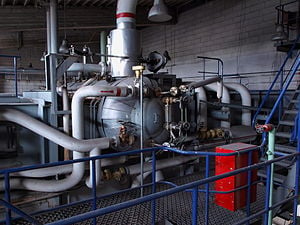With the hot, humid weather behind us, it’s time to review the status of our HVAC systems and ensure they are prepared to operate efficiently in the shoulder season and winter months.
The cooler weather means we can take advantage of economizers and shut off chillers. It also means we need to ensure our heating equipment is clean and primed for the heating season.
Economizers
This is the time of year that economizers can save lots of money on cooling costs. Many commercial buildings need cooling when outside air temperatures are not what we personally consider cooling season –outside air temperatures between 40°F and 65°F – due to internal heat gain from computers, equipment and people. Cooling systems typically deliver conditioned air at around 55°F, so using cool outside air instead of warm return air will enable you to turn off your chiller or keep your roof top unit compressors from running. In a past blog post, I discuss the trials and tribulations of the effectiveness of economizers. There are many reasons economizers do not function as designed, so check yours out and don’t let your application be one of them!
Cooling Tower and Chillers
By early-November you will want to winterize the cooling tower and chiller. This entails draining the cooling tower and checking the position of the valves within the systems in order to avoid freezing and cracking components. If this equipment remains “on” during cold outdoor temperatures, check that the freezestat controls and alarms are functioning properly, that piping is well insulated and that water treatment (like adding glycol) has been performed.
Air Handlers
Check air handler filters, coils, sheaves, and ductwork. Clean (unclogged) filters will not only save energy by minimizing the static pressure in the air handler, but will also provide cleaner air to the occupants. Clean the coils and check the belts and sheaves, check the ductwork for debris or damage to ensure efficient air delivery. In addition, check that the freezestat and alarms are functional. These, as well as water treatment such as glycol, are critical to protecting the coils from freezing and bursting.
Building Management System (BMS) and Timeclocks
Use your focus on the HVAC systems to check the programming of any control systems. Check space temperature settings, temperature setback schedule, occupancy schedules, and outdoor lighting timeclocks.
Boiler Water Temperature Reset Schedule
When outside air temperatures are very cold, the boiler needs to provide hot water (approximately 180°F), but during the shoulder seasons of moderate outside air temperatures, high temperatures can overheat the building and create short-cycling of the boiler. Most boilers are able to have a temperature reset schedule programmed either internally or through the BMS system. A reset schedule program adjusts the boiler water setpoint depending on the outside air temperature: if it is 60°F, for example, the boiler only needs to provide 130°F water and at 10°F the water temperature should be 180°F. The boiler controls will adjust the water temperature linearly from these two setpoints, saving energy, improving building comfort and prolonging the life of the boiler. My blog post on this topic from last year goes into more detail, and this presentation is a great resource.
Boiler
Have a certified HVAC boiler specialist perform a combustion check on the boilers to ensure proper and efficient combustion levels. Ensuring proper combustion is like changing the oil in the car: it increases the efficiency as well as prolongs the life of the boiler. This is also the time to inspect the venting of the boiler (checking for leaks) as well as flushing and cleaning the condensate drain connections and steam traps. All of these measures will prolong the life of your systems while they operate efficiently and provide the comfort you require.





